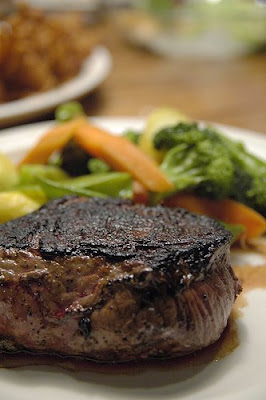Whew! There sure were a lot of happenings in LA this weekend. There was the annual
Festival of Books at UCLA, the
Grilled Cheese Invitational, and LA Weekly's
LA Weekend. I chose the underdog-- LA Weekend-- for the Jonathon Gold-moderated panel Carnivore! Perhaps the Weekly's event picked up later in the day, but attendance was slim for this excellent discussion. All of you lovers of books and bread missed out though- the range of panelists and opinons they shared were quite impressive.
The advertised participants were Jonathan Gold,
LA Weekly's restaurant critic, Mark Peel of
Campanile, Octavio Becerra of
Palate Food & Wine, and Susan Feniger of
Street. As most events do, it started about 40 minutes late, which left me curious about why there were five chairs on stage for quite some time. A surprise guest? Yes! Worth the wait. Happily, the last guest was Vinny Dotolo, co-founder of
Animal and winner (along with Jon Shook) of Food & Wine's Best New Chef award.
First of all, I thought the selection of panelists was pretty exquisite. Mark Peel is legendary, having worked with Wolfgang Puck for years. He was very intelligent and well-spoken, coming from a background of agricultural economics and history. Octavio Becerra is an chef who knows the importance of butchering skills. For years, he has been an advocate of using all parts of an animal in cooking and is a food detective, seeking out the best in all of his meats and produce. Susan Feniger spoke from a health- and environmentally-conscious perspective. Her latest restaurant venture uses meat as a "condiment" instead of in the forefront of dishes. Dotolo filled the place of the young, edgy chef who brings a refreshing passion to his work, really believing that food and cooking is
art, reflected on his menu in the phrase "changes and modifications politely declined."
Many apologies for the poor photo quality.

Gold, Peel, and Becerra

Feniger and Dotolo
One of the major conclusions was that the panelists and the attendants are not representative of our country (or the world, obviously), so even if we believe that animals deserve respect and that we deserve to eat the tastiest foods we can, not everyone shares these ideals, either because it is not a personal priority or because they simply cannot afford to invest in better quality products. Can the majority pay $16 for a humanely-raised, grass-fed, local, organic cheeseburger when the fast food joint across the street sells a moderately tasty (though heart-attack inducing, environment-destroying, and cut from an animal that has never seen the light of day) burger for 99-cents? Opinions and solutions differed between the panelists. The idealists stuck to the supply-and-demand principle, that if we spend money on higher quality products now, more will have to be produced, eventually bringing costs down. The others saw the reality that most people will never pay for higher quality meats and concluded that government regulation is the only option.
Needless to say, each panelist was on top of the current dynamics in the food world, so there was one point that left me confused. Gold's opening question hit on
Padma Lakshmi's Carl's Jr. ad. I get it. She's sexy. She was raised as a vegetarian Hindu but now eats beef. She's a pop-culture foodie icon but devours fast food. Even though I was trying not to roll my eyes that this was the first point, I was excited because I thought the issue of women in the food/meat/butchering industry would be brought to the forefront. Unfortunately, it was kind of brushed over. When the floor opened for audience questions, the first question related to feminism and meat. What a let-down it was when there was an immediate and unanimous conclusion that sexuality and carnivousness were completely seperate. Why, then, are there twice as many female vegetarians than male? Why, when dining out, do women more often dine on salad or pasta while the man orders the big, juicy steak? Why, in most households, does the only time men cook involve a grill while the women make the casseroles, desserts, salads, and baked goods?
I don't want to dwell on the negative as I really enjoyed the discussion. It was totally a celebration of meat and the way that it should be consumed-- coming from animals that were well-fed and lived a healthy, low-stress life and savored in moderation in an environment that compliments the food. It should be an experience that is intentional and respected on every level. Taking an animal's life in order to sustain our own is never something that should be taken lightly. As Peel said, it is something that is "sacred and profound, flesh to flesh."
So, are we willing to be conscious omnivores, paying more for quality meats in hopes of improving our food experience and our country's sad agricultural state? If it can be as easy as lunching on grass-fed beef and family-raised pork hot dogs from the
Let's Be Frank truck parked on Vine today, I should think so!
















